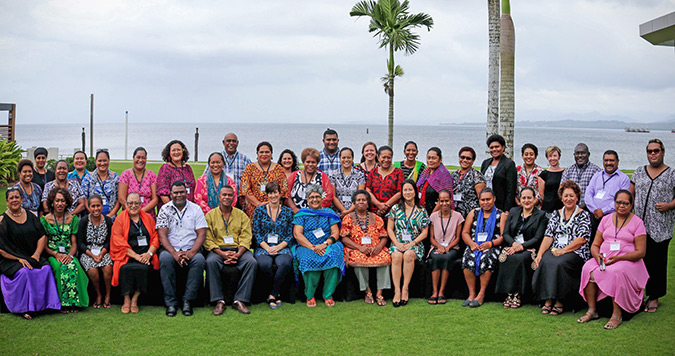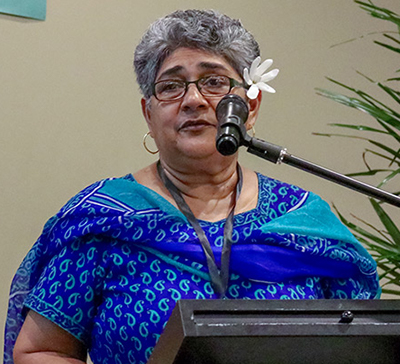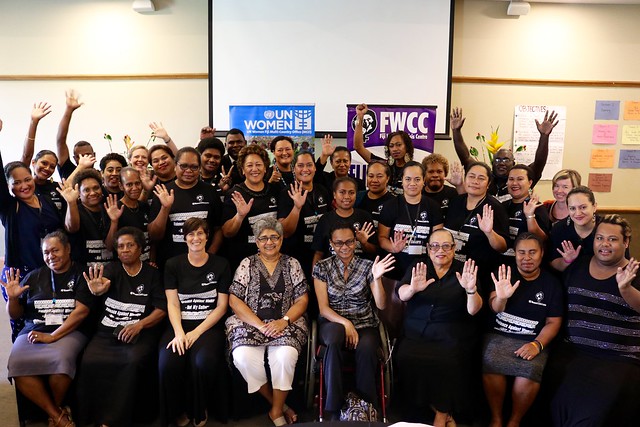Regional Authorities Responding to Violence Against Women in Emergencies
Date:

Fiji and Pacific Islands — Preparing for and responding to gender-based violence (GBV) during disasters and emergencies is a critical issue for the Pacific, with rates of violence against women already double the global average during non-disaster times.

Key representatives from government ministries and civil society organizations across Fiji, Vanuatu, Solomon Islands, Tonga and Samoa are gathering in Suva, Fiji during 23-27 October to share knowledge and identify solutions to prevent and respond to gender-based violence in emergencies (GBViE).
The Regional Training Institute of Fiji Women’s Crisis Centre (FWCC) is delivering the five-day workshop in close partnership with UN Women Fiji Multi-Country Office (MCO).
Shamima Ali, Coordinator of FWCC and Secretariat of the Pacific Network Against Violence Against Women, said “With the intensity of disasters increasing in the Pacific region, the risk of GBViE for women and children is also increasing.”
The inaugural regional workshop is convening key stakeholders in the Pacific to improve the understanding of GBViE; highlighting gaps and needs of women and girls during disasters; adapting available services; clarifying roles and responsibilities, reducing the overall risk of GBViE and enhancing coordination and information sharing.
“We have brought together frontline GBV response providers with agencies such as the National Disaster Management Offices (NDMOs) and police to address the increased risk of violence, exploitation and abuse during and following a disaster,” said Naeemah Khan, Gender and Humanitarian Analyst with UN Women Fiji MCO.
“This is especially critical for women and children; people of diverse sexual and gender identities; and people living with disabilities, as disaster can displace them from their homes and systems of protection and support,” added Ms Khan.

Abigail Erikson, Programme Manager of UN Women Fiji MCO’s Ending Violence Against Women and Girls (EVAWG) programme said, “this workshop is an important step in aligning efforts across key stakeholders such as women’s crises centres, community and government agencies in five Pacific countries towards preventing GBViE and ensuring effective support to survivors during and after a disaster.”FWCC is working towards the elimination of violence against women in Fiji and the Pacific region and provides 24-hour counselling and emergency support; community education to raise awareness on violence against women as a human rights violation; and male advocacy to change engrained attitudes which promote and perpetuate gender inequality.
“We cannot treat violence against women as a health issue, nor as a women’s issue alone - gender inequality is the main issue,” added Ms Ali.
FWCC is one of the founding members and secretariat of the Pacific Women’s Network Against Violence Against Women, the region’s longest-running network, working to eliminate violence against women since 1992.
UN Women has worked in partnership with FWCC on advancing capacity building for GBV response in Fiji and supporting activities to prevent GBV including in disasters.
UN Women Fiji MCO’s EVAWG programme aims to help women and girls live a life free from violence by providing technical assistance in developing national legislation and policies on GBV as well as technical and financial support to Pacific-led organizations focused on prevention and service provision.
“It takes time to change mindsets. It’s hard work, but we are putting ending violence against women on everybody’s agenda,” said Ms. Ali.
Photo Gallery
Media enquiries should be directed to:
Terri O’Quinn
Humanitarian Communications Officer
UN Women MCO Fiji
Ph: +679 330 1178 ext. 108
Email: terri-ann.oquinn@unwomen.org
Jacqui Berrell
Communications and Media Specialist
UN Women MCO Fiji
Ph: +679 330 1178 ext. 125
Email: jacqui.berrell@unwomen.org
Niko Rabuku
FWCC Communications
Fiji Women’s Crisis Centre
Ph: +679 999 4875
Email: Niko@fijiwomen.com
BACKGROUND INFORMATION
Fiji Women’s Crisis Centre
The Fiji Women’s Crisis Centre (FWCC) provides crisis counselling and legal, medical and other practical support services for women and children who are sufferers and survivors of violence committed against them by men. The FWCC is also involved in public advocacy and community education on gender violence. The Centre’s strategies are based on the conviction that violence against women is a fundamental human rights and development issue. The Centre’s work addresses all forms of violence against women including rape, beating, sexual harassment and abuse of children.
UN Women Ending Violence Against Women (EVAW) programme
UN Women’s Ending Violence against Women and Girls (EVAWG) Programme aims to help women and girls live a life free from violence. It is designed around international and Pacific evidence that promotes a holistic approach; empowering women and men to break the cycle of violence, while also strengthening capacity among duty bearers to manage the associated social and economic costs. The EVAW programme has three main components including adopting and implementing laws and policies that address violence against women, and the overall gender discrimination and inequality that impedes women from leaving an abusive relationship; addressing the root causes of violence against women, as well as the social norms, practices and behaviours that tolerate and condone the violence, in order to prevent it occurring in the first place; and enhancing access of survivors to essential services to address their immediate needs and prevent violence from re-occurring.
UN Women Multi-Country Office (MCO) in Fiji
The United Nations Entity for Gender Equality and the Empowerment of Women (UN Women) was created at the July 2010 United Nations General Assembly. A global champion for women and girls, UN Women was established to accelerate progress on meeting their needs worldwide. The MCO covers 14 Pacific Island Countries and Territories (PICTs): Cook Islands, Federated States of Micronesia, Fiji, Kiribati, Nauru, Niue, Palau, Republic of Marshall Islands, Samoa, Solomon Islands, Tokelau, Tonga, Tuvalu and Vanuatu. The MCO works to progress gender equality and women’s empowerment in the Pacific through four key programmes: Women’s Economic Empowerment; Ending Violence Against Women; Political Participation, Leadership and Human Rights; and Gender and Protection in Humanitarian Action.
For further information please visit:
http://fiji.unwomen.org
http://www.facebook.com/unwomenpacific
http://www.twitter.com/unwomenpacific
http://www.fijiwomen.com
